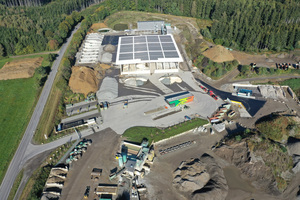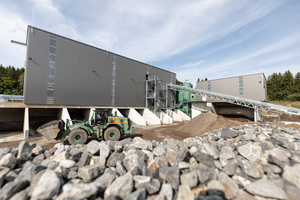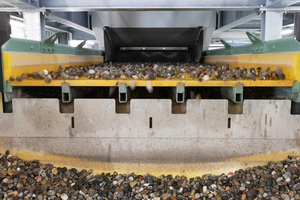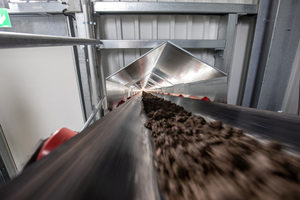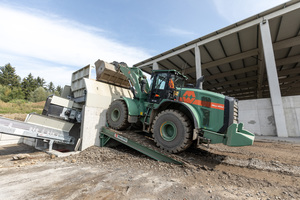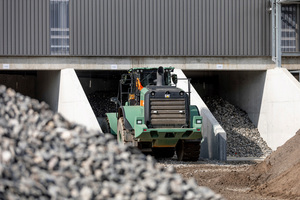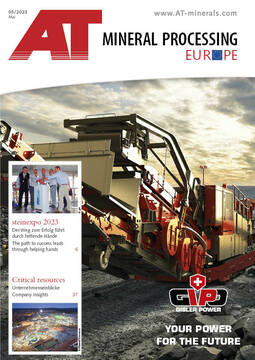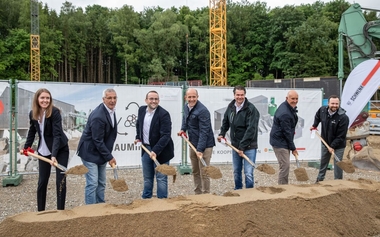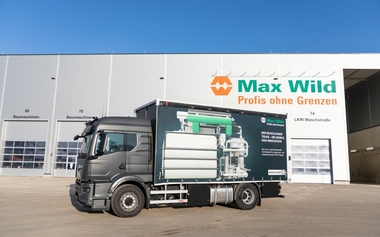From construction waste into certified secondary building materials
Max Wild’s soil washing plant has been in operation at the company’s waste management centre in Eichenberg (Berkheim) since August 2020 and has so far processed around 150 000 t of mineral construction waste annually. “The demand is high. We are noticing a change in the entire industry, towards a more resource-conserving handling of building materials. With our wet-mechanical processing plant and the resulting certified secondary building materials, we are hitting the nerve of the times,” explains Markus Wild, one of the managing directors of Max Wild GmbH. The professionals without borders offer their wet-mechanical processing as a service for municipalities, civil engineering companies as well as concrete and asphalt producers.
The soil washing plant
Max Wild’s wet-mechanical processing plant takes on a wide variety of waste: Track ballast as well as excavated soil. Even contaminated soils are cleaned and reprocessed. The recycling plant separates the soil into its individual components using a multi-stage process; the input materials are thus “washed”. Max Wild returns the sand and gravel fractions exposed during cleaning to the economic cycle as equivalent secondary building materials. The recycled construction waste is also given a second life in prefabricated concrete parts, basement walls, floor slabs or as asphalt aggregate.
With the help of the soil washing plant, however, not only high-quality recycling products and individual grain mixtures are created. It also saves landfill space because only small quantities (around 3 %) have to be disposed of. This also minimises disposal costs. The wet-mechanical processing plant thus increases the added value of the contained components and reduces disposal for the total fractions to a minimum.
The cleaning process – without any waste water at all
The material delivered to the Eichenberg waste management centre is screened to a grain size of 0/80 mm before the actual washing, the wet-mechanical processing, and fed directly to the plant. In the recycling plant, the washed material (0/80 mm) is separated and broken down by the input of mechanical energy. “We can imagine this as in a potato washing process,” clarifies Gregor Silvers, business unit manager for surface recycling at Max Wild. Downstream screening plants separate the individual aggregates. This separation is the essential performance of the plant: it separates or classifies the material into the different, marketable aggregates. Max Wild then produces individual aggregate mixtures, which in turn are used as recycled sands and gravels on construction sites or as aggregates in concrete or asphalt mixing plants.
Of course, soil washing requires water – but Max Wild also handles this resource responsibly: The water used for the wet mechanical treatment process is purified in a wastewater treatment plant and fed directly back into the washing process. Max Wild operates its soil washing plant at the disposal centre in Eichenberg completely free of wastewater.
Max Wild increases the recycling rate
“We need a sustainable approach to primary raw materials. The construction industry in particular feels what it means when raw materials like sand become increasingly scarce and thus more expensive. Only reuse and reprocessing can be the answer to the shortage of raw materials and the solution for availability and stable prices. There is great potential in the recycling of mineral building materials,” Managing Director Markus Wild is certain. Every year, around 200 million t of mineral waste are produced in Germany. According to the Bundesvereinigung Recycling-Baustoffe e.V., this makes it the largest waste mass flow in the Federal Republic. In Baden-Württemberg alone, this amounts to around 28.5 million t of soil and stones per year, according to the Baden-Württemberg Stone and Soil Industry Association (Industrieverband Steine und Erden Baden-Württemberg e.V.) in 2019. However, the recycling rate for soil material is low: just 10.6 % was recycled in 2020, as determined by the Initiative Kreislaufwirtschaft Bau in its “Mineral Construction Waste” report published in 2023.
“With our wet-mechanical processing plant, we are making an important contribution to further increasing the recycling rate and establishing the use of secondary construction materials. We know that acceptance of secondary raw materials in construction is often still lacking today. Yet they are in no way inferior to primary raw materials,” emphasises Markus Wild. All secondary building materials processed by Max Wild in the Eichenberg Recycling Competence Centre are quality-controlled and certified. They meet the high quality standards for civil engineering and road construction as well as for the concrete and asphalt industry.

